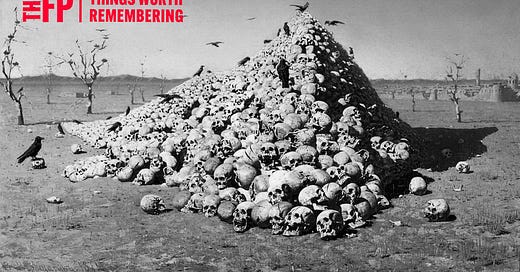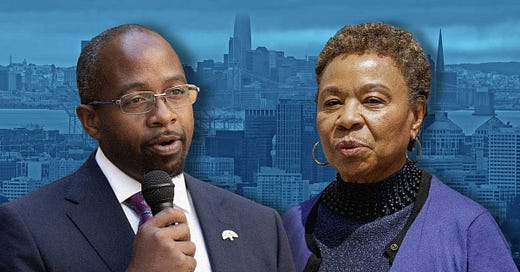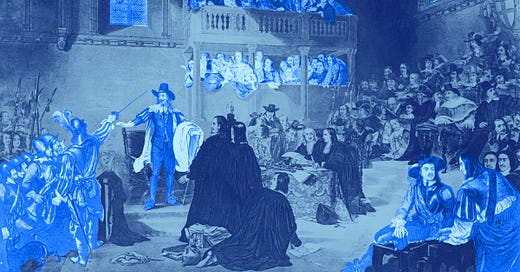
The Free Press

As we prepare to bid farewell to 2022, the feeling that seems to course through our social media, our politics, and our culture these days is one of uncertainty, ambivalence and ambiguity. It feels like nothing is quite in focus. That a lot is up in the air.
With that in mind, The Free Press asked some of the most thoughtful writers we know: What did you learn in 2022?
We’re hoping they can help us all think a little more clearly about the year that just was, and, more importantly, about the year ahead. What lessons were learned? What mistakes were made? And how do we want 2023 to be different?
Dear readers: what did each of you learn in 2022? We’d love to hear your responses in the comments.
Giving Birth Alone
By Candace Mittel Kahn
I went into labor with my second child at the precise moment my husband tested positive for Covid-19. He dropped me at the hospital but wasn’t allowed inside, so a security guard brought out a wheelchair and rolled me in. The automatic doors flew open and I turned my neck to watch them shut on the image of my husband leaning on the car and waving goodbye like we were in some twisted rom-com.
The ER was understaffed that Sunday, so I waited beside this little check-in desk as waves of contractions crucified my guts. The check-in lady looked at me, pitifully, “you’re here by yourself?” I nodded, clamping my eyes shut as another contraction started to build. “You don’t know anyone in all of Atlanta who can be here with you?” I started to cry. Everyone I knew had Covid. Including me.
The much talked-about cruelty of pandemic policies was forcing people to die alone. But it is also cruel to make people give birth alone. Which, long past vaccines, was still a policy in my hometown in 2022. I didn’t, for the record, give birth entirely alone. Two of my oldest friends took shifts with me, and I’ll always be grateful for that. But that doesn’t change the reality that my husband watched his son emerge into this world on an iPad.
My husband and I have since laughed about it. It’ll make a great story for the grandkids (and a really disturbing screenshot on the iPad). But, like watching my two-year-old daughter being forced to wear a mask on the playground, it was trust-shattering. If it weren’t for the baby, who has the unique talent of making everything—anything—okay, I’d be leaving 2022 much more cynical than when I started.
Candace Mittel Kahn is the producer of “Honestly.”
Learning To Hold My Tongue (And Tweets)
By Thomas Chatterton Williams
This was the year I finally learned the value of discretion and self-restraint. In 2022, some very public-facing billionaires that seemed to have every advantage and multiple lifetimes of accomplishments behind them revealed themselves—gratuitously and unprovokedly—to be utterly floundering. To be clueless, riddled with insecurity and false bravado so much so that all the wealth and adulation in the world could not save them or compensate for their shortcomings.
I doubt I need to name names.
The point here is not what these men did wrong, but what lessons we can glean from their highly visible missteps.
“Have more than you show, speak less than you know,” the Fool waxes sagely in King Lear. I always thought that was a good line, but watching others this past year—and, if I’m as honest and self-critical in retrospect as I need to be, the two years that preceded it watching myself—have driven home its timeless wisdom. Indeed, Shakespeare could never have anticipated how right he would be given the technological smorgasbord of outlets for oversharing we all have at our disposal today.
As my best friend told me during one of the many Twitter pile-ons I’ve been subject to, “The more opinions and views and takes you blithely send out into the ether, the more you’re like a boxer—the more body you inevitably expose.” Sometimes receiving the hits yourself is less instructive than witnessing people you’d once held in esteem volunteer for reputational beatdowns from which none of us could recover.
This is the year I learned to tweet less.
Thomas Chatterton Williams is a contributing writer at The Atlantic, a non-resident fellow at AEI, and a visiting professor at Bard College.
Empires Don’t Win Every War
By Sebastian Junger
In 2022 we learned that Russia—one of three Great Powers in the world—is capable of making nuclear threats, launching an unprovoked war of acquisition and committing mass war crimes in Europe. People who thought that that kind of nationalist stupidity had ended with World War II were dead wrong.
Fortunately, we were also reminded of an often-forgotten lesson: such tactics often backfire. And smaller nations like Ukraine stand a reasonable chance of fighting off much more powerful aggressors.
History is full of relevant examples. The Montenegrins outfought the Ottoman Empire in the 1600s despite being outnumbered by as much as twelve to one. The Irish overthrew British rule despite being badly beaten in the initial Easter Rising of 1916. And Afghans managed to resist, first the British, then the Russians, and finally the Americans.
I loathe the current Taliban regime, but it must be pointed out that empires do not win every war. If they did, freedom would not be possible, and the world would be composed of fascist mega-states. But it’s not.
Ukraine, like so many countries that have successfully resisted subjugation, has three big things going for it: a transcendent cause, leaders who are willing to die for their people, and the heavy involvement of women.
That is why I think that—with American support—it will prevail.
Sebastian Junger is the author, most recently, of Freedom, an in-depth look at successful underdog groups, as well as Tribe, War, and The Perfect Storm.
Putting My Marriage First
By Jennifer Sey
This past year was the hardest of my life. I lost my city, my job, hundreds of colleagues, countless friends and even some family relationships. But my marriage is stronger than ever.
Daniel—the man who would become my second (and last!) husband—knocked my socks off with his kindness when we met in 2012 at a bookstore. In 2022, I needed that kindness more than ever. And not just that. I needed his unwavering belief in me, his conviction that I had an obligation to say whatever I had to say, repercussions be damned.
In the throes of my struggles at work—and ultimately my ousting from my job as Levi Strauss Brand President—Daniel often said: “Why do you care what they think of you?”
“I don’t know,” I’d reply. “I just do.”
“Well don’t,” he’d say. “They’re wrong.”
Daniel made it clear from the start what he wanted for us: “I want us to have the best relationship. I want us to be closer, be more supportive of each other and have more fun and more sex than any other couple.”
This year, I discovered how much he meant that. We’ve gone through two of the most stressful experiences any couple can experience—moving and losing a job—but he never faltered. He never said, “Maybe don’t say that,” or “Maybe you should take the money and keep quiet.”
All of which is to say that I learned something we all like to believe but rarely get to put to the test: That the person I had chosen to spend the rest of my life with really loved me for me.
Though the last few years have been tough on many marriages, we’re fortunate. I try not to compare myself to others, but when it comes to fun and sex I think we’re doing more than ok.
Jennifer Sey was Levi’s brand president until February 2022 and is the author of Levi’s Unbuttoned.
The Future (in Iran) Is Female
By Masih Alinejad
This year the whole world learned what I have known for a long time: When the thugs of Tehran are finally toppled, it will be because of women.
Those who have been the most victimized by the medieval theocracy that rules Iran’s nearly 87 million people will be the ones who will save it—not by way of guillotine or mass chaos, but by summoning great courage.
We got a taste of what’s to come this September, when the long percolating angers over water shortages, economic woes and the imposition of Islamic law blew up over the murder of Mahsa Amini, a 22-year-old woman beaten to death by Iran’s “morality police” for wearing her hijab incorrectly. Countless women in Iran and across the Muslim world saw her murder for what it was: Fear of female empowerment camouflaging itself as religious piety. And they were repulsed.
As for me, I learned something I had long suspected but never really grasped until girls and women in Tehran, Ardabil, Zahedan and other cities across Iran started taking off their headscarves and taking to the streets to declare, “Death to the dictator!” That is that the revolution—the desire for liberation—lives in every single person. We all want freedom. But only some of us are brave enough to say it out loud.
That internal revolution connects us across time and place. And it gives us strength to carry on in the face of unimaginable brutality.
Masih Alinejad is an Iranian journalist and activist. She is the author of “The Wind in My Hair: My Fight for Freedom in Modern Iran.”
Government Power v. People Power
By Jay Bhattacharya
From the beginning of the Covid-19 pandemic, I was a vocal critic of lockdowns and school closures that I believed would cause more harm than good. In October 2020, with Sunetra Gupta of Oxford University and Martin Kulldorff of Harvard University, I wrote the Great Barrington Declaration, which proposed protecting vulnerable people while lifting lockdowns for the majority of the population. In other words, it advocated a return to classic principles of pandemic management that had worked to limit the harm of other respiratory virus pandemics. Tens of thousands of scientists signed on.
Four days after we wrote it, the head of the National Institute of Health, Francis Collins, wrote to Anthony Fauci, labeling us as “fringe epidemiologists” and calling for “a quick and devastating published takedown” of the declaration. A propaganda campaign quickly ensued, with various media sources falsely accusing me of wanting to let the virus rip. It wasn’t just the press. Recently I learned in these pages that Twitter placed me on a secret blacklist to limit the reach of my tweets.
So what did I learn in 2022? I learned in a very concrete and painful way the effects of Washington and Silicon Valley working together to marginalize unpopular ideas and people to create an illusion of consensus.
This censorship and smear campaign deprived the world of a needed debate over Covid policy and might have avoided much unnecessary suffering by children, the poor, and the working class harmed by lockdowns.
But this year contained a second related lesson–one that leaves me with a lot of hope. In February, Canadian truckers—90 percent of whom were vaccinated—protested their government’s restrictions on unvaccinated people, which were a gross violation of human rights. The Canadian government declared a state of emergency, froze bank accounts, and jailed protest leaders. But ultimately, the truckers won the day, and the government lifted the restrictions.
This story taught me that the most effective counter to governmental overreach comes not from scientists or experts or bureaucrats, as I naively thought before the pandemic. Instead, freedom came because of ordinary people who were willing to risk their reputations and well-being to demand it.
Dr. Jay Bhattacharya is a professor of health policy at Stanford University, where he has taught in the medical school for over two decades.
Who My Real Friends Are
By Alex Perez
In October, after an interview I published in a literary magazine on the woke takeover of publishing went viral, I was bombarded by a Twitter mob. I thought I knew how to handle it—I’d seen the same thing happen to enough people to know, intellectually, that it would pass if I ignored it. But the constant barrage of notifications and strangers demanding my social banishment had its intended effect: I was shaken up.
By the third day straight of monitoring every tweet and subtweet, fielding emails from editors and former classmates I hadn’t heard from in years, I had started to lose my cool when I called my friend Willie. “Let’s chill,” I said.
Willie, like most of my friends in Miami, knows I'm a writer, but his understanding of what I do is vague at best. The one time he asked me what I write about I said, “Culture shit.” There were no follow up questions and we quickly returned to our usual topics of conversation: the Miami Dolphins and professional wrestling.
Willie is not on Twitter. Willie is not aware that the literary scene is run by passive aggressive ideologues. Willie, may or may not have read a single book in the last year. Willie will certainly not read this piece. Willie, quite simply, is a great friend, and just the guy I needed to be with as the interview went viral.
Willie's friendship, like the one I share with my best friend, Cos, predates any minimal clout or status I've achieved as a writer. They liked me when I was an unpublished loser, and if I am indeed ever banished from the literary world for my spicy takes, they'll have my back and laugh at my great return to loserdom. I love them for that.
As a younger writer in Miami, I often bemoaned the lack of a literary community, but it turns out that the only community I ever needed was the one of non-writers and normies I already had. Since the interview was published, I've been called brave by countless writers for stating common sense truths about the state of the literary scene, but that’s nonsense. I had nothing to lose. I couldn't lose a community I never had, and I certainly wasn't going to lose my real one.
Alex Perez is a cultural critic and fiction writer living in Miami.














I have learned that gratitude is a far more powerful way of living in this world. I was given an ALS diagnosis 3.5 years ago with an initial start a year before, so I seem to be ahead of the averages. As my world shrinks, I am able to read such great things as TFP. I read of the ideologies, i.e., woke, that present resentment as a dominant world view driven by anger, angst, and strong envious desire for what one does not have and what others have. I am thankful for many things including reading the thoughtful views of so many people.
I learned to be patient for the pendulum to start swinging the other way, and for the real people to take over from the absurd, the bullies, the crybabies, the mean people. Anonymity breeds contempt.